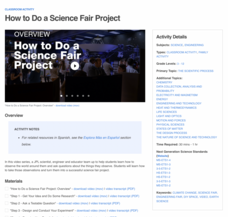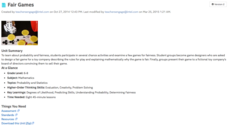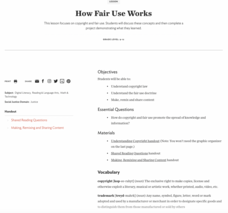Newseum
Media Ethics: Fairness Formula Starts With Accuracy
As part of a study of media ethics, young journalists apply a fairness formula to news reports. They look at accuracy, balance, completeness, detachment, and ethics to determine if the reporting is fair.
Overcoming Obstacles
Fairness
Fairness is the subject of a lesson designed to boost relationship skills and social awareness. Class members discuss that fairness is getting what you need when needed, differences are okay, and review classroom rules to identify their...
NASA
How to Do a Science Fair Project
Build problem-solving skills with science! Step-by-step videos walk investigators through each stage of completing a science fair project. Scientists learn to formulate a testable question, design an experiment, collect data, draw...
Newseum
Is It Fair?
Young journalists learn how to analyze word choice, context, and counterpoints to judge the fairness of a news story. They practice using these tools to judge a series of headlines for the story of Goldilocks and the Three Bears. They...
Newseum
Am I Being Fair?
Young journalists use four strategies from an "Am I Being Fair?" tip sheet to check for and counter personal biases about a topic. Scholars apply the strategies to an article about the best pizza as guided practice. Participants then...
Intel
Fair Games
Who said things were fair? The unit introduces probability and its connection to fairness. The class interacts with activities of chance and plays games to relate them to fairness. Groups design a fair game and develop a presentation....
Deliberating in a Democracy
Globalization and Fair Trade
Have you ever traded something? How do you know you got a good deal? Scholars use case studies and research to determine the role of globalization in fair trade. Class members examine consumer demand and competition bring to light the...
Newseum
Reporting Part III: Staying Objective
The third and final lesson in the Reporting series tests young journalists' ability to be objective in reporting contentious topics. After brainstorming a list of contentious topics that interest them, the class selects one, and...
Anti-Defamation League
Student Dress Codes: What's Fair?
The controversy over school dress codes continues. The debate involves questions like, why is there a policy? Who sets the policy? Who enforces the policy? What is a fair policy? Tweens and teens have an opportunity to engage in the...
Teaching Tolerance
How Fair Use Works
What's fair is fair! Using the resource, scholars discuss the key differences between fair use and copyright. Next, in small groups, pupils create and present projects that demonstrate fair use of copyrighted material, such as a song,...
EngageNY
Setting Purpose for Research: What are Fair Working Conditions?
Life may not be fair but working conditions should be. Scholars research working conditions at Wegmans by studying the company website. They complete a working conditions anchor chart and discuss their findings in a think-pair-share...
Critical Thinking Cooperative
Doing Our Share
Whether at home or in the classroom, each member of a community has certain responsibilities they must tend to. With the help of the children's story Piggybook by Anthony Browne, kids learn how to assign jobs in a fair and safe manner...
Canadian Civil Liberties Education Trust
That’s Not Fair!
As part of a series of critical thinking exercises, kids consider issues of social justice, especially the factors that must be considered when trying to balance conflicting rights and freedoms.
iKeepSafe
The First Amendment, Copyright, and Fair Use
Do I have a right to make a copy? Head off this commonly asked question with this colorful, informative infographic, and promote digital citizenship in your class by directing learners to ask the right questions before downloading...
Teach With Movies
Title: "Pygmalion" - Topics: Drama/England; World/England
“What do you mean that my language is improper?” Prior to My Fair Lady was Pygmalion. Fair Eliza’s struggles with English, which according to George Bernard Shaw “is not accessible even to Englishmen,” come alive in the 1938 film version...
Nemours KidsHealth
Sportsmanship: Grades K-2
Students discover how to play sports fairly by role playing sports scenarios in class. In this sportsmanship lesson, students participate in a charades activity in which they act out a random event while the class decides if this is an...
National Security Agency
Are You Game? A Lesson Connecting Fractions and Probability
Exactly how fair are the board games children grow up playing? Young mathematicians investigate this questions as they work their way through this five-lesson series on basic probability.
Scholastic
Ruby Bridges: A Simple Act of Courage, Grades K-2
A civil rights movement lesson designed specifically with the Common Core State Standards in mind, young learners are introduced to the story of Ruby Bridges as the first African American child to attend an all-white elementary school....
C-SPAN
Survey Analysis- Public Perceptions of Voting and Elections
The perception of fairness in elections becomes more important with each passing election. Using data from a C-SPAN poll, budding historians consider the differences between how people perceive elections. The resource includes videos of...
DocsTeach
Analyzing a Letter from Jackie Robinson: "Fair Play and Justice"
Jackie Robinson was more than a baseball legend; he was an activist, too. An interesting resource explores Robinson's time in the military using primary sources. Scholars examine the racially inspired event that led to a court martial...
Health Smart Virginia
Taking Turns
Scholars work cooperatively, taking turns, to boost peer relationships and fairness. Rotating through five stations, players practice tossing, bouncing, push-ups, and working together to clean up fallen equipment, then rate their...
Smarter Balanced
Intellectual Property
To prepare for a study of intellectual property rights, (or an assessment) introduce your learners to the legal concepts and key vocabulary associated with the debate. After defining intellectual property, copyright, fair use, and...
Eau Claire Area School District
Intellectual Property Lesson Plans
Fair use, intellectual property, public domain ... what does it all mean? Scholars act as judges to determine if different scenarios constitute fair use. They also advance their research skills by practicing paraphrasing and citing...
J. Paul Getty Trust
O Greek Shape! O Fair Pose!
Everything old is new again. The Los Angeles J. Paul Getty Museum presents a activity on how Greek black-figure painting influenced eighteenth century Neoclassical artists. After looking at a series of examples, class members create...
Other popular searches
- Character Education Fairness
- Character Counts Fairness
- Honesty and Fairness
- Fairness and Integrity
- Judicial Fairness
- Justice and Fairness
- Lessons on Fairness
- Democracy Fairness
- Probability Fairness
- Fairness: Character Counts
- Fairness Lesson Plans
- Philosophy for Kids Fairness

























